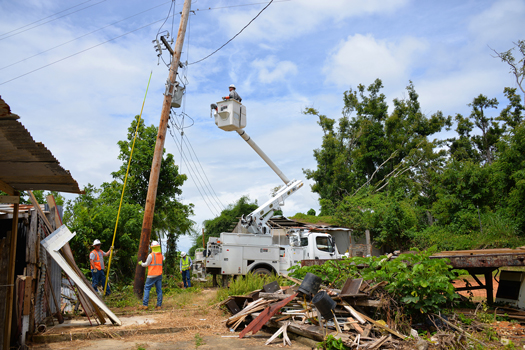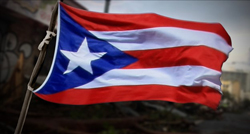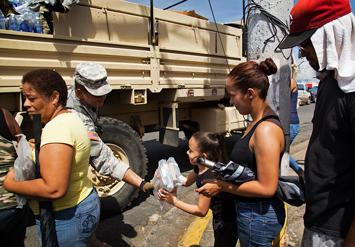A hobbled Puerto Rico braces for new hurricane season
By Barrington M. Salmon -Contributing Writer- | Last updated: Jun 20, 2018 - 2:28:21 PMWhat's your opinion on this article?

Electrical workers contracted by the U.S. Army Corps of Engineers energize a line to restore electricity to the Sector Limon de Marquez neighborhood of Jayuya, Puerto Rico, May 4. Photo : U.S. Army Corps of Engineers
|
Shortly after researchers from Harvard University’s T.H. Chan School of Public Health released findings of a months-long survey that an estimated 4,645 died in Puerto Rico in the aftermath of Hurricane Maria, grieving individuals and families trekked to the spacious marble-lined plaza in front of the island’s capitol building in San Juan.

|
There, in reaction to the researchers’ data, relatives of the dead laid out hundreds of pairs of shoes that belonged to family members lost in the wake of the killer storm—the worst to hit the island commonwealth in 90 years. The survey and study was published in the New England Journal of Medicine.
The rows of shoes were a somber reminder not just of the hurricane’s devastation, but to remind public officials that flesh and blood human beings were taken, and also to serve as a public rebuke of the inadequate response by the Trump administration, Puerto Rico’s Governor Ricardo Rosselló and local government officials.
The Harvard researchers estimate that the thousands who died succumbed to causes attributable to delayed or interrupted medical care in the months following the Sept 20, 2017 storm. In addition to medical service interruption, lack of access to roads and that the island was left with no electricity or Internet and cell phone connections contributed to the deaths, researchers, experts and observers say.
Most affected were the elderly, people needing dialysis or operations for other illnesses, those suffering from asthma and other respiratory diseases, the poor, residents living in poverty, people living in mountain regions, near rivers and in the heart of the commonwealth’s rugged interior and those who live in the southeastern part of the island.
Hurricane season started June 1 with the prospect of a slate of hurricanes raking the Caribbean even though the Puerto Rican government is ill-prepared should another disaster hit the already overwhelmed island. Families, especially those in the countryside, are still struggling to obtain electricity, medicines and medical care and food. Much of the island hasn’t moved from the relief effort stage to recovery and rebuilding.

Survivors in Barrio Obrero receive water and food Meals Ready to Eat (MRE) provided by FEMA. FEMA and the Puerto Rico National Guard work together to provide and deliver life sustaining resources to Puerto Rico's survivors in the aftermath of Hurricane María. Photo: Yuisa Rios/FEMA
|
“This not anything the surprised anyone who was paying attention,” said Ms. Bannan, who is also president of the National Lawyers’ Guild, the oldest progressive bar association in the U.S. during a May 29 interview on Sputnik Radio. “It’s important to note that the 4,645 deaths could be as high as 8,000 and it’s not as a result of the hurricane. Those who died as a direct result of the storm may number in the 30s or 40s. But this is the result of massive government negligence if not criminal negligence. The failure of government caused all those thousands to die.”
Foreign Policy expert Asha Castleberry said it’s unfortunate and ludicrous that as Puerto Rico moves into the 2018 hurricane season, the island is wholly unprepared to face a hurricane of any magnitude.
“The Trump administration has failed Puerto Rico. People may think that what Puerto Ricans are experiencing is exaggerated because they’re not there on the ground. It will definitely take a lot to do more to help those affected by the hurricane.”
In New York on June 2, hundreds of primarily Puerto Rican protesters, gathered near the United Nations complex demanding that UN officials audit the number of dead Americans. The Puerto Rican government, in response, said it is reviewing its official death toll even as Gov. Rosselló and health officials have stubbornly held onto an official death count of 64.
“If it were 5,000 kittens, there would be outrage,” said Elizabeth Yeampierre, executive director of Uprose, a New York-based Latino organization. “If it was 5,000 dogs, there would be outrage. If it was 5,000 blonde-haired, blue-eyed women, there would be outrage.”
Rashad Robinson, executive director of Color Of Change, said the lack of attention to Puerto Rico’s recovery is intentional.
“Donald Trump doesn’t care; his administration doesn’t care. All they care about is how much they can fleece from these countries,” he said. “They wait for islands to hit rock bottom. The Heritage Foundation seeks to privatize everything. This is a part of its project. Hurricane Katrina illustrated what geographical discrimination and generational poverty looks like. This shows the lack of power Puerto Ricans have.”
The killer storm walloped the American commonwealth, leaving a path of destruction that brought most activity on the 5,335 square-mile island to a standstill.
Despite the utter devastation caused by Hurricanes Irma and Maria, the island’s 3.4 million residents have been studiously neglected and then ignored by the Trump administration and Congress and is yet to garner the substantive relief from the federal government that other storm-ravaged cities like Houston and parts of Florida have received.
Almost 300,000 homes were destroyed and 400,000 more were damaged. And a fragile, aging electrical grid and dilapidated infrastructure elsewhere that was already in disrepair was no match for the hurricane.
“Puerto Ricans have been forced to leave the island that they otherwise would want to be in as a result of the hurricane and the economic crisis,” Ms. Bannan said. “Crises and disasters like these just uncover the deep structural inequities that were already existing. Just like Maria did. Maria left many homes damaged and destroyed and dismantled the infrastructure.”
“The island is nowhere near better. The island is experiencing deep austerity, and a control board that is not dealing with any of the structural inequities. We need a political solution and a path towards decolonization. Puerto Ricans have no control of their affairs. Statehood isn’t the solution to political challenges. Puerto Rico needs Puerto Rican-centered solutions.”
It’s clear, Ms. Bannan and several critics assert, that Puerto Ricans have been treated the way they have because of their colonial and second-class status, the fact that they have a non-voting congressional representative, they can’t vote for president and also because the majority of the island’s residents are Black and Brown.
The Trump administration delayed dispatching military personnel and material relief until after the hurricane made landfall, and let the Jones Act waiver lapse, reducing the number of ships that can bring aid to the island. These actions have slowed recovery considerably.
Political Economist Pedro Cabán, an expert in Puerto Rican political and economic change, also said he believes that Hurricane Maria could be another watershed moment that redefines U.S. treatment of Puerto Rico.
“The Donald Trump administration’s response to the crisis reveals that Puerto Ricans are racialized as subordinate, despite their U.S. citizenship, said Dr. Cabán, professor of Latin American, Caribbean and U.S. Latino Studies at the State University of New York in Albany. “Trump’s racially charged statements resurrected long dormant, degrading characterizations of Puerto Ricans as lacking the capacity and will to fend for themselves.”
Dr. Danielle Pilar Clealand said the worst hurricane to hit Puerto Rico in more than 80 years has racialized Puerto Ricans.
“Puerto Rico occupied an elite position in the Caribbean and was considered one of the whiter Caribbean islands, but they’re being racialized,” said Dr. Clealand, assistant professor in the Department of Politics & International Relations at Florida International University’s Cuban Research Institute.
“They’ve been racialized as non-whites in ways they haven’t before. This is causing them to change their perspective as it relates to who they are. That component is something to watch as people re-envision where they stand in the world.”
INSIDE STORIES AND REVIEWS
-
-
About Harriett ... and the Negro Hollywood Road Show
By Rabiah Muhammad, Guest Columnist » Full Story -
Skepticism greets Jay-Z, NFL talk of inspiring change
By Bryan 18X Crawford and Richard B. Muhammad The Final Call Newspaper @TheFinalCall » Full Story -
The painful problem of Black girls and suicide
By Charlene Muhammad -National Correspondent- » Full Story -
Exploitation of Innocence - Report: Perceptions, policies hurting Black girls
By Charlene Muhammad -National Correspondent- » Full Story -
Big Ballin: Big ideas fuel a father’s Big Baller Brand and brash business sense
By Bryan Crawford -Contributing Writer- » Full Story






 Click Here Stay Connected!
Click Here Stay Connected!








